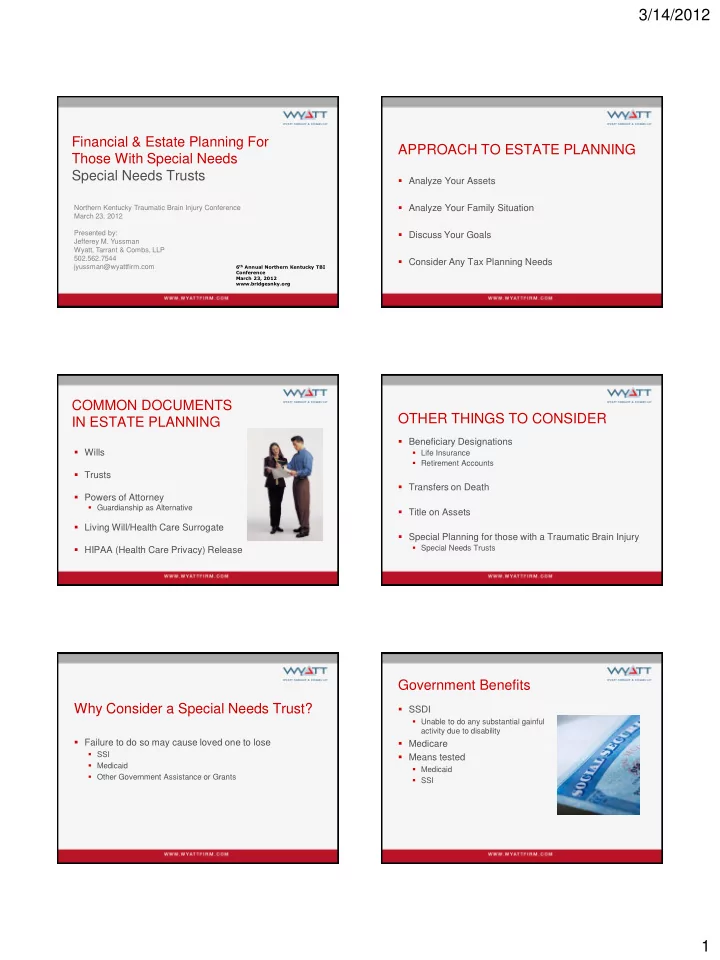

3/14/2012 Financial & Estate Planning For APPROACH TO ESTATE PLANNING Those With Special Needs Special Needs Trusts Analyze Your Assets Analyze Your Family Situation Northern Kentucky Traumatic Brain Injury Conference March 23, 2012 Presented by: Discuss Your Goals Jefferey M. Yussman Wyatt, Tarrant & Combs, LLP 502.562.7544 Consider Any Tax Planning Needs jyussman@wyattfirm.com 6 th Annual Northern Kentucky TBI Conference March 23, 2012 www.bridgesnky.org COMMON DOCUMENTS OTHER THINGS TO CONSIDER IN ESTATE PLANNING Beneficiary Designations Wills Life Insurance Retirement Accounts Trusts Transfers on Death Powers of Attorney Guardianship as Alternative Title on Assets Living Will/Health Care Surrogate Special Planning for those with a Traumatic Brain Injury Special Needs Trusts HIPAA (Health Care Privacy) Release Government Benefits Why Consider a Special Needs Trust? SSDI Unable to do any substantial gainful activity due to disability Failure to do so may cause loved one to lose Medicare SSI Means tested Medicaid Medicaid Other Government Assistance or Grants SSI 1
3/14/2012 Medicaid Covered Services Medicaid Overview Long-term care Physician services Federally based Hospital Limited state resources Adult day care Administered through state or county agency Federal minimum standards, but states allowed flexibility Home health care Estate Planning Options/ Third Party Special Needs Trust 3rd Party SNTs Protects resources without sacrificing government Disinherit benefits Gift to child with disabilities Wholly discretionary trust Distribute to sibling Individual with disabilities must be sole beneficiary of Supplemental Needs Trust trust during his lifetime Payback provision Trustee’s Discretion Supplemental Needs Trust Sole, absolute and unfettered discretion Income and principal No payback requirement No support standard Can direct corpus at death of Beneficiary – no right to compel beneficiary to any individual Express intent No age limit Emergency clause 2
3/14/2012 First Party Special Needs Trusts For: Funding Third Party SNT Life Care Plan Unplanned Inheritance Life Insurance Personal Injuries ILIT Matrimonial Action Crummey Powers Etc. Beneficiary Designations 42 USC 1396p First Party Special Needs Trusts Options: First Party Special Needs Trust (d)(4)(A) trust Accept the money Payback trust First-party trust Transfer Pooled Special Needs Trust Spend down (d)(4)(C) trust Pooled trust Self settled SNT First Party and Pooled Special Needs (d (4)(A) Trusts Special Needs Trusts Established by the individual’s parent, grandparent, legal Disregarded as available income and resources guardian or court Created with the assets or income of the individual with No SSI or Medicaid penalty period disabilities when under age 65 Contributions after age 65 are subject to transfer penalty Inheritance provisions PI lawsuit Matrimonial action 3
3/14/2012 Pooled Trust Why Create a d(4)(A) Trust? Non-profit 501(C)(3) organization as trustee Reimbursement is only for Medicaid, not all public Must be irrevocable benefits Beneficiary may be any age Reimbursement is based on actual Medicaid Medicaid asset transfer issue after expenditures, not prevailing market costs age 65 No interest Some services not readily available in the private market Moral of Our Story Pooled Trust If you FAIL to PLAN … Created and managed by non-profit association May be established by the individual Separate accounts maintained for the benefit of individuals with disabilities You are PLANNING to FAIL Modified payback provision Solution PLAN to SUCCEED by considering a special needs trust for your child or other loved one with special needs 4
Recommend
More recommend